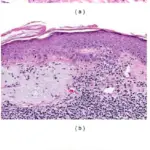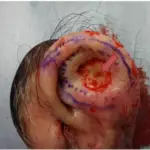Basal cell carcinoma is a nonmelanocytic skin tumor arising from basal cells.
What is the Pathology of Basal Cell Carcinoma?
The pathology of basal cell carcinoma is:
-Etiology: The cause of basal cell carcinoma is radiation exposure, gene mutations, immunosuppression, idiopathic.
-Genes involved: TP53 gene.
-Pathogenesis: The sequence of events that lead to basal cell carcinoma are due to pluripotential cells of the basal layer of the epidermis/follicular that are abnormal.
-Morphology: The morphology associated with basal cell carcinoma shows a scale, erythema, and a threadlike raised border.
-Histology: The histology associated with basal cell carcinoma shows large, hyperchromatic, little cytoplasm, and oval nuclei basalioma cells.
How does Basal Cell Carcinoma Present?
Patients with basal cell carcinoma typically common in males present at an age range of 55-70 years. The symptoms, features, and clinical findings associated with basal cell carcinoma include slowly widening lesions, waxy papules, ulceration, with crusting that bleed when injured.
How is Basal Cell Carcinoma Diagnosed?
Basal cell carcinoma is diagnosed through the clinical presentation.
How is Basal Cell Carcinoma Treated?
Basal cell carcinoma is treated through surgery, chemotherapeutic.
What is the Prognosis of Basal Cell Carcinoma?
The prognosis of basal cell carcinoma is good with a 100% survival rate for those that have not spread.



